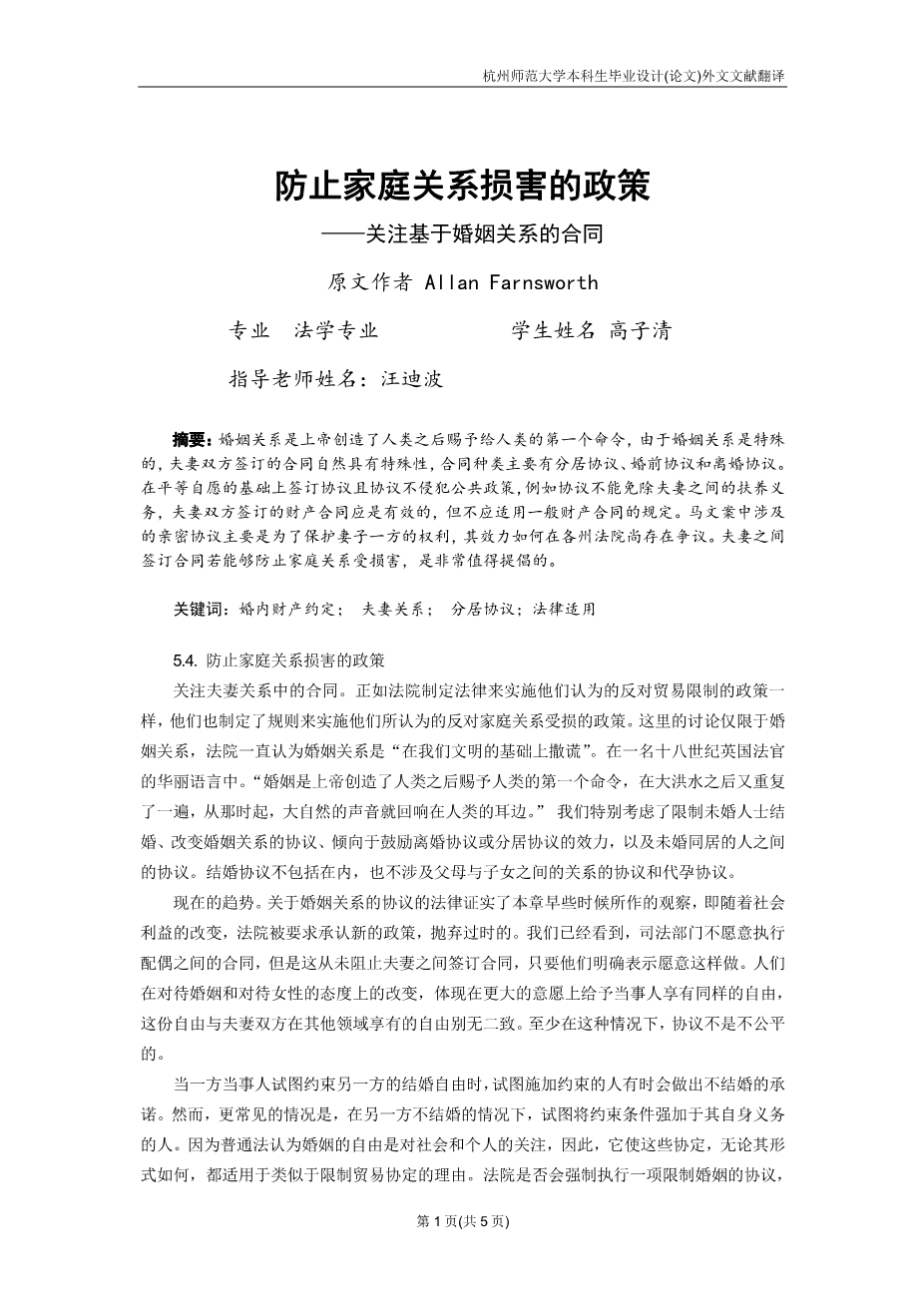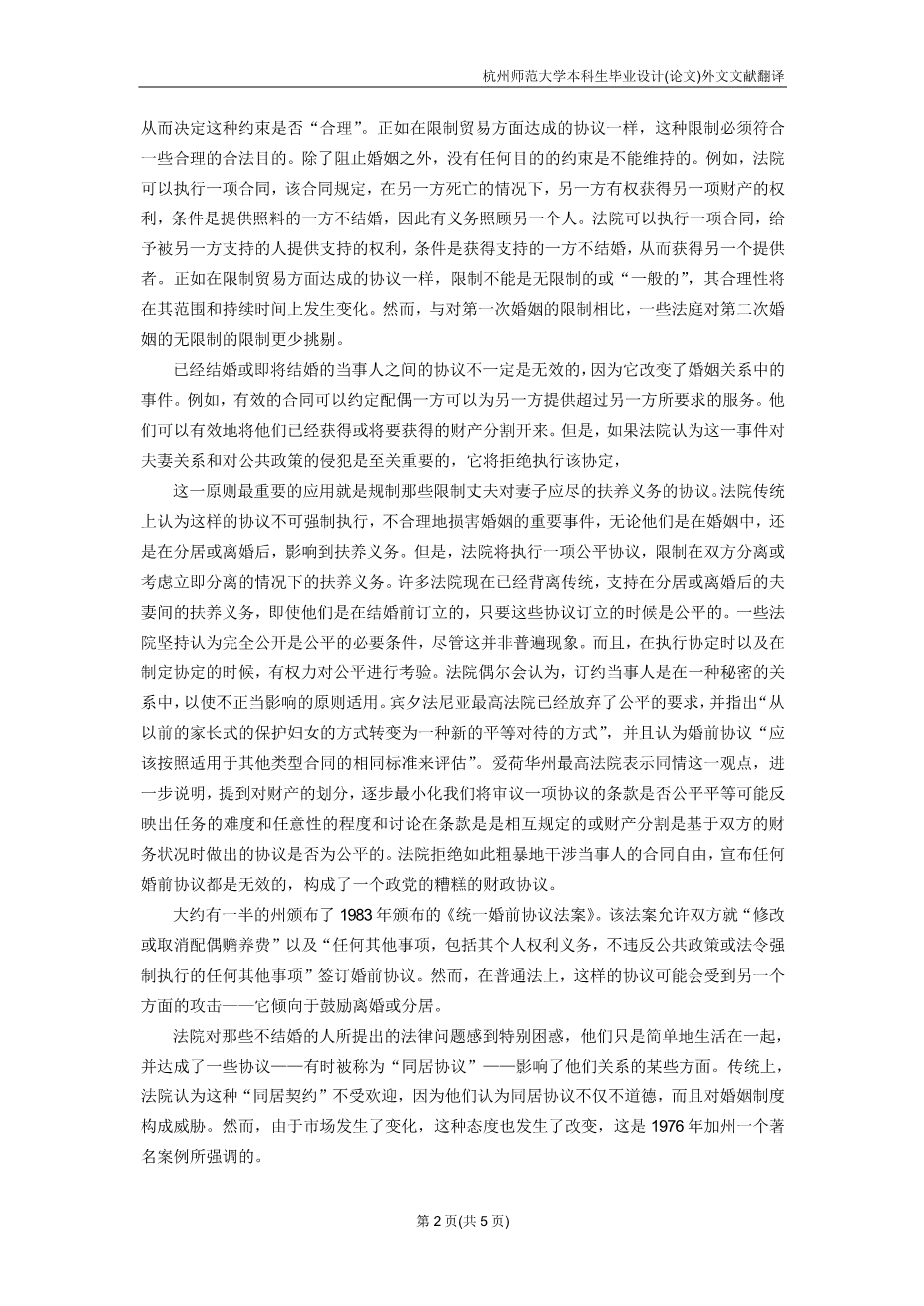防止家庭关系损害的政策--关注基于婚姻关系的合同外文翻译资料
2022-12-29 11:43:27


英语原文共 5 页,剩余内容已隐藏,支付完成后下载完整资料
附外文文献原文
5.4. The Policy Against Impairment of Family Relations
Just as courts shaped the law to implement what they perceived to be the policy against restraint of trade, they also fashioned rules to carry out what they saw as the policy against the impairment of family relations. The discussion here is confined to the marriage relationship, which courts have long regarded as lying “at the foundation of our civilization.” In the florid language of an eighteenth-century English judge.” matrimony was one of the first commands given by God to mankind after the Creation, repeated again after the Deluge, and ever since echoed by the voice of Nature to all mankind. We consider in particular the validity of agreements restraining the freedom of unmarried persons to marry, of agreements changing the incidents of the marriage relationship, of agreements tending to encourage divorce or separation, and of agreements between persons living together without being married. Agreements to marry are not included, nor are agreements involving the relationship between parents and children and surrogacy agreements.
Polices Developed by courts
The law on agreements relating to the marriage relationship bears out the observation made earlier in this chapter that as the interests of society change, courts are called upon to recognize new polices and discard obsolete. We have already seen that judicial reluctance to enforce contracts between spouses has never prevented them from marking contracts with each other as long as they make clear their intention to do so. Changes in attitudes toward marriage and toward women have been reflected in a greater willingness to grant parties the same freedom of contract in connection with the marriage relationship that they enjoy in other areas, at least as long as the agreement is not an unfair one in the circumstances.
When one party to an agreement seeks to restrain the other partyrsquo;s freedom to marry ,the seeking to impose the restraint sometimes attempts this by having the other promise not to marry. More commonly, however, the one who seeks to impose the restraint conditions his or her own duty under the agreement on the otherrsquo;s not marrying. Because the common law regarded the freedom to marry as of concern to society as well as to the individual, it subjected such agreements, whichever their form, to a rule of reason analogous to that applicable to agreements in restraint of trade. Whether a court will enforce an agreement in restraint of marriage thus turns on whether the restraint is “reasonable.” As with an agreement in restraint of trade, the restraint must serve some legitimate purpose to be reasonable. A restraint that serves no purpose other than to discourage marriage will not be upheld. For example, a court may enforce a contract that gives a person who undertakes to care for another a right to receive property when the other dies, on condition that the one providing the care does not marry, thereby becoming obligated to care for an additional person. And a court may enforce a contract that gives a person who is being supported by another the right to support, on condition that the one receiving the support does not marry and thereby acquire another provider. As with an agreement in restraint of trade, the restraint must not be unlimited or “general,” and its reasonableness will turn on its extent and duration. Some courts, however, have been less critical of unlimited restraints on second marriages than of such restraints on first marriages.
An agreement between parties already married or about to marry not necessarily invalid because it changes the incidents of the marriage relationship. Spouses may, for example, validly contract for one of them to furnish services beyond those that would otherwise be required. And they may validly contract to divide property that they have acquired or will acquire. If, however, the court regards the incident as essential to the relationship and the change as offensive to public policy, it will refuse to enforce the agreement,
A particularly important application of this principle comes under agreements that limit the duty of support that the husband owes the wife. Courts have traditionally held such agreements unenforceable as unreasonably impairing an essential incident of marriage, whether they affect the duty of support during the marriage or only after separation or divorce. But a court will enforce a fair agreement limiting the duty of support if it is not made until the parties have separated or contemplate an immediate separation. And many courts have now departed from tradition and upheld agreements limiting the duty of support after separation or divorce, even if they are made before marriage, as long as they are fair. Some courts have insisted on full disclosure as essential to fairness, though this is not universal. And there is authority for imposing a test of fairness at the time of the implementation of agreements as well as at the time of its making. Courts have occasionally held that engaged parties are in a confidential relationship so that the doctrine of undue influence applies. The Supreme Court of Pennsylvania has abandoned the requirement of fairness, noting “a shift away from the former paternalistic approach of protecting women towards a newer approach of equal treatment,” and holding that prenuptial agreements “should be evaluated under the same criteria as are applicable to other types of contracts.” The Supreme Court of Iowa voiced sympathy for this view, observing, with respect to the division of property, that the “gradually minimization of the extent to which we will review the terms of an agreement for fairness and equity may reflect the difficulty and arbitrariness of the task” and concluding that an agreement is fair when its provisions “are mutual or the division of property is consistent with the financial condition of the parties at the time
剩余内容已隐藏,支付完成后下载完整资料
资料编号:[280043],资料为PDF文档或Word文档,PDF文档可免费转换为Word




